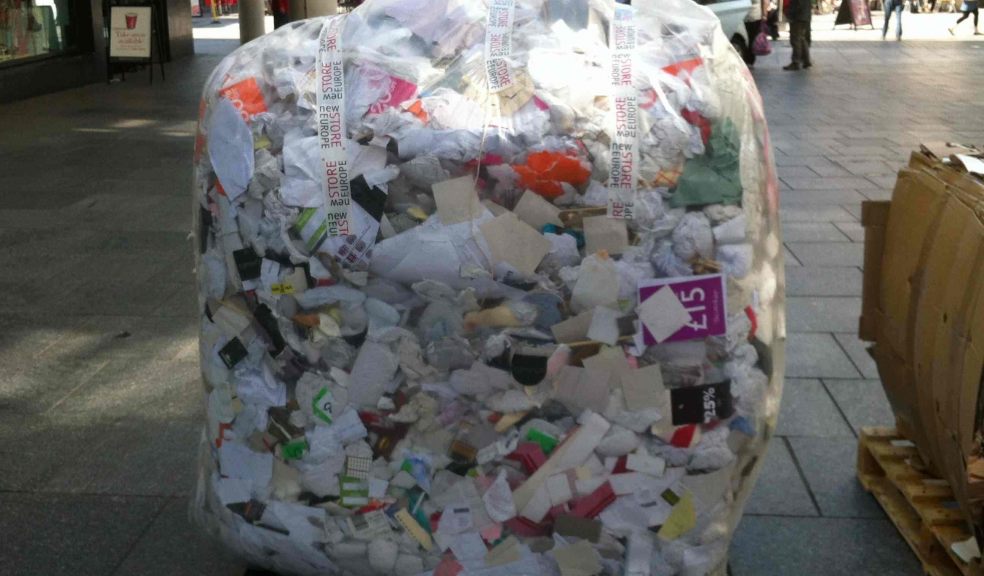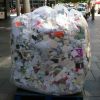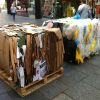
10th Anniversary of Recycle Week celebrated from 17 to 23 June
Recycle Week is a celebration of everything associated with recycling! Now in its tenth year, Devon will be celebrating next week by joining forces with Heart Radio and giving listeners the chance to win a range of exciting recycling-related prizes.
During the last 10 years the people of Devon have put their heart and soul into recycling. The recycling rate has increased from 22% to 55% but there is still more that we can do. Recent research has shown that large quantities of recyclable materials are still being thrown away such as paper, card and food waste.
Listen out for daily competitions focussing on what happens to our recycling and what it’s made into? Each day on Heart a different recycled material will be featured and listeners will have three questions to answer in order to recycle (up cycle) their prize resulting in a fantastic prize package.
Councillor Roger Croad, Cabinet Member for Community and Environmental Services at Devon County Council, said: “As this year is a special anniversary for Recycle Week, it’s a great time for us all to join together and celebrate how far Devon has come over the last ten years and promote all the good work you’ve been doing to support recycling. Recycling is so important because it really helps to reduce landfill, conserve resources, save energy, protect the environment and create employment.”
To recycle more of your waste you could:
• Check if you are recycling all the materials that are collected from your home
• Remember to recycle your glass jars such as jam, marmalade and pasta jars
• Check the bathroom for items that can be recycled too such as shampoo and shower gel bottles
• Remember you can take glass bottles to your nearest recycling bank
• Start or take part in a recycling scheme where you work or at school
For more information about recycling, what happens to what we recycle and the Heart competitions please visit www.recycledevon.org
Recycling Facts:
Glass
• Glass takes up to 4,000 years to decompose in a landfill, yet can be recycled indefinitely.
• The energy saved by recycling one glass bottle will power a computer for 25 minutes.
• Over 80% of the glass collected for recycling is used in the UK, the majority of it to make new glass bottles and jars.
Textiles
Clothing (known as textiles) has recently become one of the fastest growing waste streams in the country. This is because of the trend for buying cheaper ‘disposable’ clothing that is only intended to last as long as the particular fashion or season. The knock-on effect of this trend is that fewer people are using charity shops, choosing instead to buy new cheap clothes.
• It is estimated that we spend about £40 million on clothes every year in this country and throw about 1.5 million tonnes away. Around 80% of which are sent to landfill.
• Did you know? In some African countries, roughly 80% of people wear second hand clothes. Many of these have been donated by people from all over the world.
• Despite most old clothing being sent to landfill, clothing is one of the easiest things to recycle through charity shops, doorstep collections and jumble sales. There is also a growing trend towards selling old clothing on websites like eBay.
• One tonne of textiles is worth around £400 with even higher prices paid for higher quality, clean material.
• It is estimated that we recycle less than 20% of the clothes we throw away. Of those that we do recycle, 50% are recycled into new textiles and 50% are reused either in this country or overseas, such as Eastern Europe, Africa or the Middle East.
Tins and Cans
Aluminium
• The energy saved by recycling just one aluminium can would run a fridge for 1 hour, boil a kettle 3 times or power a television for 3 hours.
• Aluminium can be recycled endlessly with no loss of quality.
• Aluminium is lighter than steel which reduces transport costs.
• It takes less energy, and material, to produce aluminium compared to steel.
• Recycled aluminium saves 95% of the energy needed to produce it from scratch.
Steel
• 80% of our tins and cans are made from steel.
• Steel can be recycled endlessly with no loss of quality.
• Steel cans preserve food naturally and do not need additives.
• Steel cans are approximately 35% lighter than they were 20 years ago.
• One tonne of recycled steel saves two tonnes of raw materials. This is a 70% energy saving.
Paper
• All of the newsprint manufactured here in the UK is now made from 100% recycled paper;
• Every tonne of paper recycled saves 17 trees.
• It takes just seven days for a newspaper to be recycled into new newsprint and sold in Devon!
• Production of recycled paper reduces air pollution by 95%.
Plastic
• Plastic can take up to 500 years to decompose.
• One recycled plastic bottle saves enough energy to power a 60-watt light bulb for 3 hours.
• It takes just 25 two litre drink bottles to make one adult size fleece.
• Each year food shops give away enough carrier bags to cover the whole of London with a layer of bags! By switching to a ‘Bag for Life’ the average person can prevent around 300 plastic bags ending up in landfill sites each year!
• A UN report in June 2006 estimated that on every square mile of ocean there are 46,000 pieces of plastic debris floating!





















